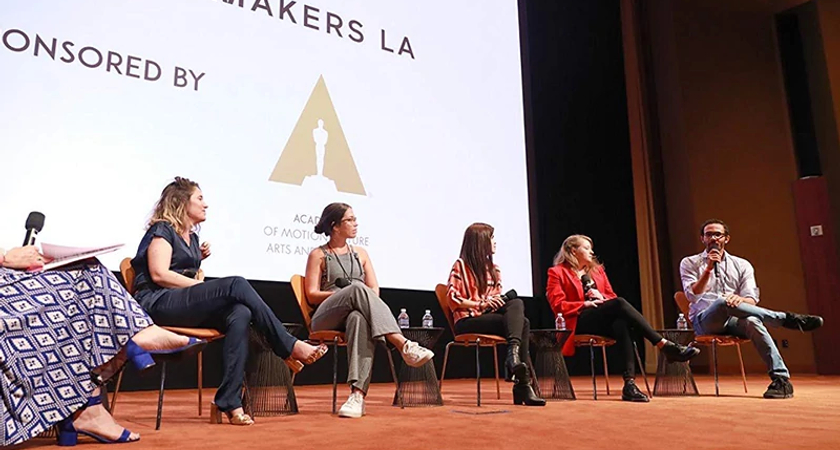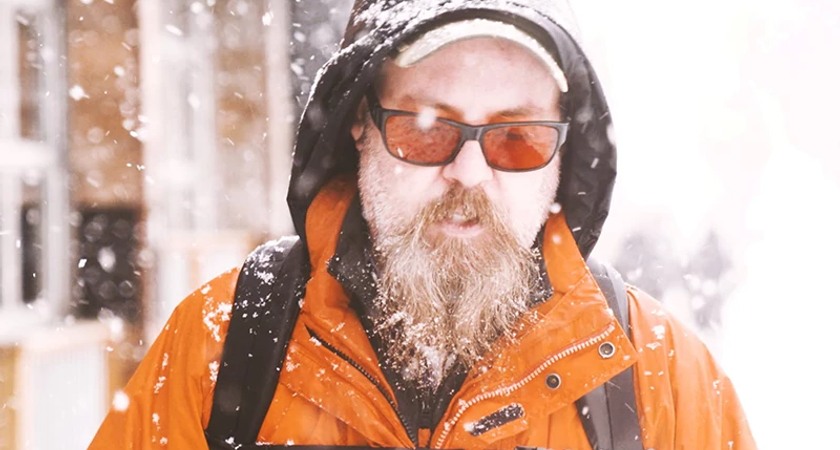Bosco da Costa, a 2020 graduate of the Broadcasting – Radio, Television, Film & Digital Media program is celebrating two self-directed films that have hit the festival circuit. However, his road to filmmaking started in a unique way.
Bosco enrolled in law school in Brazil, where he’s originally from, but realized halfway through that it was not his passion. After completing his degree, he knew he wanted to explore more of his creative side and that is when he took the leap to pursue media at Centennial. Arriving as an international student, Bosco was able to transition into a domestic student in his third semester because of his past educational achievement, which ultimately ended up helping him out after all. “The law degree was very important because through the law degree, I was able to get my permanent residence here in Canada,” he says.
Having this expansive interest of media as his guide, Bosco chose Centennial so he could be exposed to various areas at once. “I decided to pick Centennial College because their program is very broad. I would be able to practice TV, film, radio, and digital media, and then by the end of the program, I would be able to pick what would be best for me… If I do want to pursue a career in the filmmaking business or the television business, I know that I’m ready either way,” he explains. Bosco describes that the atmosphere of this program is great, particularly due to its breadth. He says, “One of the great things about Centennial is you get to do all of the positions. You get to be director, you get to be the DOP, the editor… you get to take all of the positions in a film crew, all of the positions in the television studio, and you get to learn a little bit of everything.”
Despite pursuing law school first, Bosco knew since he was a child that he had a love for film and television. “Television was a very important part of my childhood because I grew up in Brazil in the ’90s and it was very dangerous so my parents wouldn’t let me play outside and I would basically stay at home all day. I’d go to school and then come back and stay home… I’d watch films and shows and it became really important to me and it is a very important part of my life.” He continues, “Initially, this was what I intended to do when I finished high school. I wanted to study film and television, but then I chose money and studied law and was miserable. Now I’m following the dream.”

The first film Bosco had hit the festival circuit with was Argemira. “It’s a short documentary about a nun in Brazil and I shot it all by myself; I went to Brazil for a week, shot the film, and came back. It was really well received and it was screened at the Latinx Festival at the Academy of Motion Pictures… It was a really great experience,” he says. The documentary also went on to play at the Orlando Film Festival and other festivals across Europe, and it will be screened for the first time in Brazil this year. Bosco crafted a stunning narrative within this documentary that illustrates life, love, family, and devotion which ultimately demonstrates his innate storytelling capability.
The second, more recent film to hit the festival circuit was This-Ability. The short documentary follows Kostantino Beltsis, a visually impaired man, who happens to be a Centennial grad of the Television & Film – Business program, on his journey around Toronto with his guide dog Abide. It showcases the ways in which he has to adapt on a daily basis and it demonstrates in Kostantino’s words what it’s like to have a condition such as his. Bosco says, “Jeannette Loakman, a Centennial Instructor, introduced me to him. She told him I had this idea about shooting a documentary about a blind person and translating his disability, which is blindness, to a visual medium… She said to me, ‘Well this is going to be a challenge, but you need to find someone with a good personality and that will have something to say.’ Then she said she had the right person for me who was a former student and so she made the connection and it was great. He’s very blunt and doesn’t have any filter, and he talks very openly about his disability.” This made for such an engaging tone that carried through the entire documentary.
The way the documentary was shot is quite visually compelling. Bosco was tasked with taking a visual medium that is a film and translating it in a way that would allow the viewer to have a hint of what Kostantino’s day is like. He says, “I sat down with Kostantino and he explained to me how he perceives the world. For example, sometimes he can’t see anything, but other times he can see a little bit of shadows and difference in lights, so I tried to translate this in the documentary.” Through a mixture of textures, sound, and music, Bosco wanted to get very close to the way Kostantino perceives the city around him. “It’s an important topic because during the film he talks a little about how [Toronto] is not as well prepared yet to welcome blind people. There are many adaptations that need to be made… For example, many people don’t know that you shouldn’t walk your dog off-leash if you’re in the street because it may cause some distraction to guide dogs… and he has to deal with that kind of situation on a daily basis,” he says.
“I believe people got interested in the documentary because it was shot in a very unique way. You won’t see wide shots of the city and you won’t see anything well defined. You’re going to see a lot of things out of focus, and basically, the only thing you’ll be able to see well is Kostantino’s face… You will hear people interacting with him, but they will not be seen on camera. This was one of the ways that I decided to portray his disability. By not showing the audience who he is interacting with was a way to translate a little bit of blindness in the film,” Bosco explains.
This-Ability was screened in July of this year at the InFocus: Canadian Cinema festival hosted by NewFilmmakers Los Angeles, and it was also selected to play at the 2020 Liberation Docfest in Bangladesh. Due to COVID-19, both screenings were presented online, but the festival spirit and excitement remained.

Another visual medium Bosco engages with is photography. “I started photographing back in Brazil before I started shooting films. Since I loved media as a little kid, I decided to buy a camera and just start practicing. I started shooting and then people started liking it and enjoying my work and I was invited to shoot portraits and weddings and events… and when I got here in Canada, I was able to continue this activity,” he says. Check out an example of Bosco’s work below to see how he put together 5,000+ photographs to tell a thrilling story.
Currently, Bosco has been taking this time to shape a few scripts and projects he has going on, with one of them being a feature film that is in collaboration with Centennial and the international department about the Gaelic communities in Scotland and Canada. An exchange program that runs between Centennial and the University of the West Scotland provides students with the chance to “go to Scotland for a week and shoot a documentary and come back,” as Bosco explains. However, this short documentary had so much content that he says they were able to get a bit more funding, thanks to Program Coordinator Chris Terry, and shoot a feature film that is intended to be completed by the end of this year.
Bosco’s advice to those interested in filmmaking is, “you have to be resilient”. His courage in following his passion and pursuing filmmaking is something that we can all take a lesson from. Congratulations on all of your current and future achievements, Bosco!
By: Alexandra Few
